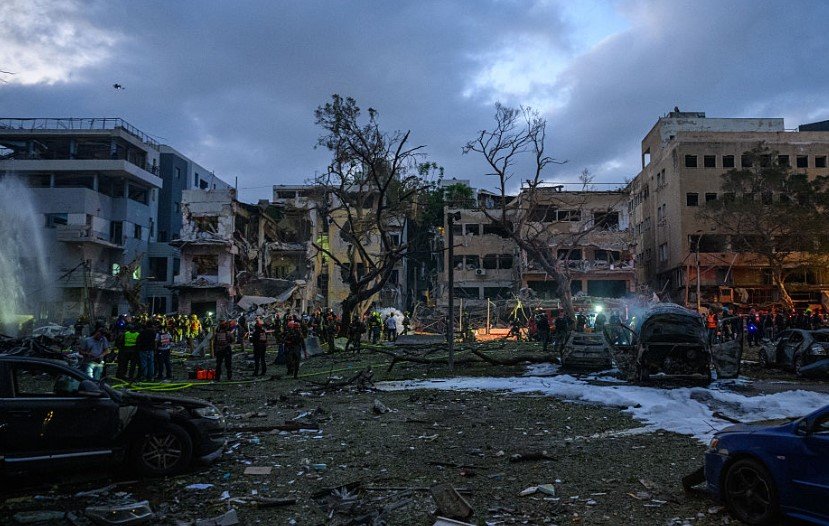The father-in-law of a well-known Tallahassee rabbi describes sleepless nights, deadly missile strikes, and a community holding tight in the face of rising fear.
Eliezer Reinhold doesn’t usually keep his phone glued to his side. But these aren’t normal days.
Back home in Petah Tikva, just outside Tel Aviv, the air is still—until it’s not. Reinhold, the father-in-law of Florida State University Chabad Rabbi Schneur Oirechman, has spent the past week ducking for cover as ballistic missiles scream overhead, part of a fresh and dangerous escalation between Iran and Israel.
A War Zone, One Text Away
Reinhold visits Florida often. “I’ve been to Tallahassee more times than I can count,” he joked once to a friend, according to his son-in-law. But this week, his ties to the U.S. feel like they belong to another lifetime.
Late Sunday night, Israeli officials confirmed that multiple missiles were launched from Iranian territory. Dozens of sirens pierced the quiet in central Israel, including Tel Aviv and surrounding areas. One landed just half a mile from Reinhold’s home.
What Happens When the Alarm Sounds
It’s not chaos, Reinhold says. It’s mechanical, clockwork. The way fear can become routine is maybe the most jarring part of it all.
When the warning comes—and you’ve got ten minutes, sometimes less—you run. He and his neighbors rush to a shared shelter.
He described the scene:
-
Everyone from the building comes down, sometimes in pajamas.
-
Strangers pull open the door for neighbors still racing in.
-
Windows are sealed shut with sandbags.
-
No one talks much. Just waiting.
Then comes the sound. Or the silence. Both are unbearable in their own way.

The One That Hit Too Close
In the early hours of Monday, a missile landed just blocks away. Reinhold said the blast rattled the windows of his building.
“That was the closest one yet,” he said.
Israeli authorities later confirmed that the strike in Petah Tikva caused multiple fatalities and serious structural damage. Reinhold didn’t know the victims personally, but said he had walked by that building countless times.
The Iron Dome—Israel’s missile defense system—intercepted the majority of the projectiles. But it only takes one to slip through for everything to change.
A City Pulling Itself Together
In the aftermath, Reinhold says something else took over: community.
“Almost immediately, people started organizing a clothing drive,” he said. “Because those who survived only had what they were wearing when they ran to the shelter.”
He said it’s like watching a city learn to breathe through its pain.
One apartment complex near the impact zone was completely gutted by the explosion. Within hours, donation tents popped up. Teens sorted shoes. Mothers passed out water bottles.
The makeshift aid effort became a lifeline for those suddenly without even a toothbrush.
Life Between Sirens
By day, Tel Aviv isn’t dead. Not yet. People go to work. Kids laugh at parks. Couples still order coffee at sidewalk cafes.
But everyone’s checking their phones.
The Home Front Command has loosened restrictions for now—people can leave their shelters—but trust is fragile.
“You never know,” Reinhold says. “It could be quiet for two days, then boom.”
There’s a rhythm to fear now: go out, come back, check updates, pack the go-bag again.
For Reinhold, nights are the hardest.
“It’s dark, the sirens echo louder, and you can’t see where it’s coming from,” he said.
He added in a quieter tone, “You just wait. And hope it’s not your building next.”
Tallahassee Watches From Afar
Back in Florida, Rabbi Oirechman and the local Chabad community have been glued to updates.
Calls, texts, even Facetimes—whenever the connection holds up—have become lifelines. The rabbi hasn’t made public remarks yet, but sources close to the family say he’s “watching every update with a heavy heart.”
Tallahassee has a small but tight-knit Jewish community. And like others with family in Israel, they’re bracing for what could come next.
A local member told WCTV, “It’s not some far-off story anymore. It’s our families.”
Israel’s Defenses Tested
Israel’s Iron Dome has handled countless attacks since its deployment in 2011. But this latest barrage is different.
Here’s a breakdown of the current missile interception performance as reported by the IDF:
| Missile Source | Intercepted | Breaches | Civilian Injuries | Fatalities |
|---|---|---|---|---|
| Iran | ~85% | 10–15 | Several minor | 6+ |
| Gaza | ~90% | Few | Dozens | 3 |
| Lebanon (Hezbollah) | ~80% | Unknown | Ongoing | Ongoing |
Officials say the system is “strained but holding.” Yet many fear if the rate of launches increases, it could become overwhelmed.
No End in Sight—But Still, Hope
Nobody’s throwing around the word “normal” anymore. That left the chat a while ago.
Still, Reinhold says he’s grateful. For the technology that’s saved lives. For neighbors who hold the door open at 2 a.m. And for the folks across the ocean who keep checking in.
“You don’t feel forgotten,” he said. “That matters.”
Whether the missiles stop tomorrow or the conflict grinds on, one thing is clear: People like Reinhold are still in their homes. Still answering their phones. Still holding on.
